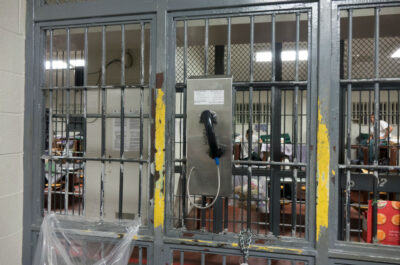
Lyon v. ICE, et al
What's at Stake
On June 14, 2016, the American Civil Liberties Union, along with the ACLU of Northern California, and the firms Orrick, Herrington & Sutcliffe and Van Der Hout, Brigagliano & Nightingale, have filed a settlement agreement in the class-action suit Lyon v. the U.S. Immigration Customs and Enforcement agency (ICE). The settlement requires the agency to give detainees at four Northern California immigrant detention facilities improved access to telephones, including creating private spaces for free and direct calls, delivering phone messages, removing arbitrarily short limits on call duration, and making accommodations for indigent immigrants.
Summary
The main point of contention in the case was detained immigrants’ access to functional telephones while undergoing immigration proceedings. Due to severe constraints on telephone use at the detention facilities, contacting attorneys, securing witnesses, and gathering evidence was nearly impossible. The due process afforded by the Fifth Amendment of the Constitution, as well as the Petition Clause of the First Amendment, give detained immigrants the right to communicate with attorneys and witnesses and gather evidence for their cases—including through the use of telephones.
The case detailed situations at county jails in Sacramento, Yuba, and Contra Costa counties, as well as a private prison in Bakersfield, California, where arbitrary technical barriers and restrictions on movement prevent detained immigrants from being able to effectively contact government and legal offices, contact potential witnesses and obtain records, and make confidential attorney calls. Additionally, many calls are prohibitively expensive; at one facility, a 10-minute intrastate call can cost as much as $5.50.
The insufficient and restrained access to affordable calling options is a violation of immigrants’ constitutional rights. The settlement requires ICE to make vast improvements in phone access at the four detention facilities so that immigrants have a fair chance at defending themselves against deportation, and to modify its nationwide detention inspection forms to more meaningfully evaluate telephone access.
Legal Documents
-
06/14/2016
Lyon v. ICE, et al - Settlement Agreement
Date Filed: 06/14/2016
Affiliate: Northern California
Download Document-
01/06/2016
Lyon v. ICE, et al - Complaint
Date Filed: 01/06/2016
Affiliate: Northern California
Download Document-
01/06/2016
Lyon v. ICE, et al - Order Granting Plaintiffs' Motion to Modify Class Certification
Date Filed: 01/06/2016
Affiliate: Northern California
Download Document-
01/06/2016
Lyon v. ICE, et al - First Supplemental Complaint for Injunctive and Declatory Relief
Date Filed: 01/06/2016
Affiliate: Northern California
Download Document-
01/06/2016
Lyon v. ICE, et al - Order Granting Plaintiffs’ Motion for Class Certification
Date Filed: 01/06/2016
Affiliate: Northern California
Download Document-
01/06/2016
Lyon v. ICE, et al - Plaintiffs' Notice of Motion and Motion for Summary Adjudication
Date Filed: 01/06/2016
Affiliate: Northern California
Download DocumentPress Releases
ACLU Settlement With ICE Will Allow Immigrants Held in Detention to Use Functional Telephones for Contacting Lawyers, Families, Government Agencies
